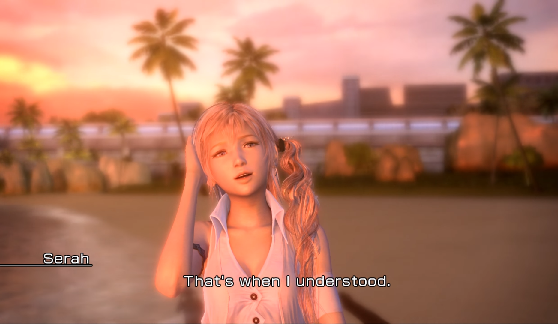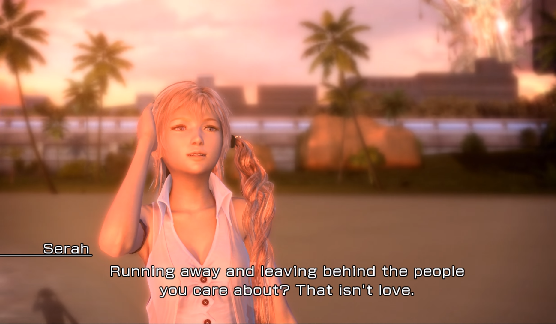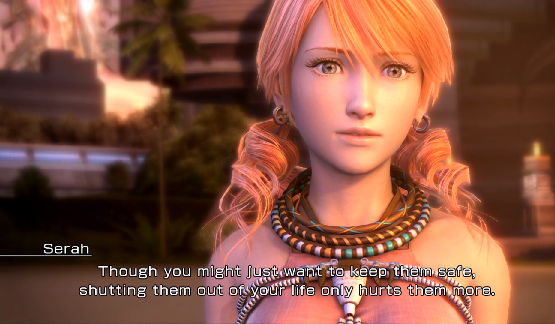My impression of FFXIII was always that the themes and visuals were number one in that series. The songs Fighting Fate and Born Anew were essentially the most memorable for me as they summed up the conflict's ideas and struggles and piggy-backed one another.
I remember watching the trailer of Lightning fighting the soldiers in Cocoon and thinking "How the heck are they going to implement this in a Command Menu?"
But, as time went on, they actually did something similar with Dissidia Final Fantasy.
Of course, the setting was one-on-one at first, and you don't fight multiple enemies at once... but this actually evolved in the gameplay we now have with Dissidia NT.
Again, that doesn't feel as "good" as it should be, because you can EASILY get mobbed. And, assuming you had monsters instead of other enemy parties to fight, all the more reason why such a concept is difficult to implement unless you're given the right combat tools and allies to help you.
Dissidia NT also simplified the characters down to universal Brave attacks and the option to pick which HP attacks and EX skills to bring with you...
Now, if FFXIII was going to be an action-paced game, it would've made more sense to do what Dissidia NT has done instead of throwing players an overly convoluted Crystarium grid.
I also think that Crisis Core was also a good example of what a GOOD action RPG could be, because in the end you're going solo against multiple enemies, and managing your loadouts and which allies you want for assists would have better served you.
I know I'm gushing about Dissidia, but it really is a good concept and the closest they've gotten to achieving the goal of an "Advent Children" action-rpg game.
Take the Temple of Chaos (Omega) stage in Dissidia Duodecim:
You have this area with so much terrain to cross, walls and structures to hide behind, pillars that can help you dodge spells and what have you... and then somebody smashes you through the floor and the ceiling comes crumbling down on top of you changing the area completely!
If you're going to implement action in to a game, the game needs to flow quickly and seamlessly without stopping in illogical ways.
Take Final Fight: Streetwise as an odd example... you have this guy running around town talking to folks and punching people who are causing trouble in his neighborhood.
The game's a beatemup, but it has so many areas to explore, missions to tackle, people to talk to for exposition, and even items and goodies to grab as you progress. You even pay people to teach you new martial arts techniques!
At its core, Final Fantasy has struggled with the transition from Fighting to Questing to Fighting again (you can see this in the very first FF game, actually).
FFXIII could've taken a few cues from Final Fantasy VI in that you basically had party members separated in to groups, but they still had enough linearity to grow, make decisions on approaching areas, and even a level of exploration.
Terra tagging along with Locke for the first time introduced players to how the game should be played, but it also gave them places to explore and areas to examine up until they reached a certain area which changed the pace of the story.
You could still do a lot of things before coming to that "point" in the story, and the game didn't cap you for progress or limit you too much. Any mechanics you had were built-in for the most part and not strongly reminding you about Magicite or Accessories which are used later.
It gave you everything you needed to play around long enough until you decided to further the story and have Locke and Terra meet up with Locke's allies.
FFXIII had this idea of "characters on the run", but that was implemented early on in FFVII. Cloud was part of a terrorist organization called AVALANCHE on the run from the Turks, but that essentially meant they could do anything so long as Shinra corp didn't know about it (the Wall Market was a seedy part of Midgar that nailed this home for me). So there was plenty of non-linearity to that aspect of the game.
Part of what FFXIII suffers from is multiple-creators fighting over what the ultimate concept was supposed to be. Like the video said, you had one guy who HATED Non-linear worlds, and you had another guy who INSISTED on unique inflections for Vanille.
Japanese culture (as far as I know), is a very detail-oriented one. They nitpick and perfect-ionize EVERYTHING. That alone is part of the problem. There's no room for transition or conversion of ideas to other cultures. Japan lives in its own BUBBLE of concepts and they seldom ever think about what Europe or America think, except in derision mostly.
That is ALSO why the Japanese game industry has been floundering compared to the West in recent years. There is no open-mindedness, no willingness to compromise or adapt.
That has begun to change with individuals who rebel against the establishment, like with Hideo Kojima, but it still has a long ways to go.
With FFXV, you can notice a lot of ideas and more broad-minded concepts put together piecemeal and structured in ways that they realize (FINALLY!) that they were too strict in their own standards.
But, there's something they still need to do if they really want to perfect what will be the future of FF: I mean of course the FFVII Remake.
Make a game that not only uses different ideas, but uses those ideas in ways that link one idea to the next as seamlessly as possible. It shouldn't feel out-of-place, jarring, or non-sequitur.
I think what they've done with FFXV's character-switching is a step in that direction, but it still could go even further. Being able to take characters in their own routes and change the story from the perspective of who you're playing as.
As one developer said, making towns and cities to explore (and people) is hard work. But I think a certain amount of love and creativity could be applied to each and every place, without making it feel like a chore, but rather a canvass of expression. I think Lightning Returns hit this point home for me.
Each area in Lightning Returns had its own culture and "vibe", people had different beliefs and they did things at their own pace, regardless of anyone who showed up. I think that's a good thing.
Like the difference between Kalm Town, Midgar, and Rocket Town... different places, different rules to play by.
Ultimately, FFXIII was a learning experience that Square-Enix needed to refresh their memory that they aren't the utmost authority on RPG-making.
I think if they realize the throne isn't theirs to sit on all the time, address things like a challenger rather than a champion... things will improve even more than they have.





